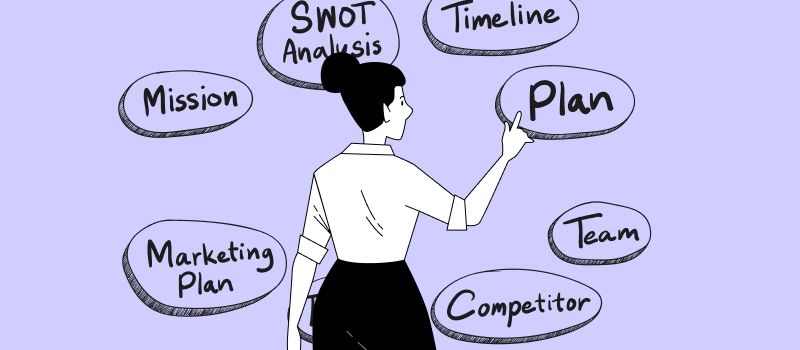
Among all celebrities and successful people, Olympic athletes seem to be the most admired ones. Their effort and commitment inspires sports fans around the world. Those who are not fans of any sport discipline or particular athlete, still admire their stamina and will to win.
There should be some lessons that those who work on business goals can learn from the Olympic athletes – their habits and principles can be useful in business, management, and everyday life. Let’s take a look!
1. Setting goals – big and small
While Olympic games are the main goal of any athlete, there are many competitions in between. By carefully setting goals to participate in all important events and reach the maximum potential by the Olympics, the athletes achieve success. And they’re not afraid to aim at the highest goals! When Ted-Jan Bloemen, Canadian gold and silver medalist in speed skating, started talking about setting new world records, everyone thought it’s ridiculous – until he started doing it.
Takeaways: set your main and interim business goals, define your available resources, and prepare a plan. Remember that ambitious doesn’t necessarily mean impossible!
2. Thorough planning
Olympic athletes plan their training schedules up to four years in advance, adapting them to many sport events – not only to the Olympic games. Their plans include literally everything: travel, training and recovery regimen, nutrition, and more. They stick to their plans and schedules, which is crucial for reaching the goals.
Takeaways: think through as many details as possible, include them in your plan, and stick to it.
3. Commitment and dedication
It is hardly possible to follow through set plans if you’re not committed. Remembering about your business goals creates commitment and dedication, which helps find strength to keep working out day by day. It is only possible if you truly love what you’re doing – some can’t even explain how they achieve their surprising results. “I can’t explain witchcraft” is the famous phrase of Adam Rippon, bronze medalist of Winter Olympics 2018, about his Olympic medal.
Takeaways: be mindful about why you’re doing your work, and love what you do.
4. Working hard
When having a plan for a great achievement, the athletes are ready for hard work. Being an Olympic athlete is not an accidental success, it is the result of years of effort. For those who aim to achieve Olympic goals, there’s no such thing as “I’ll do this later” or “I’m too tired to keep working on this”. Just imagine: four hours on ice, two hours in gym, one hour of treatment, and up to an hour of mental prep work – that’s a typical training day of Tessa Virtue, Canadian figure skater and gold medalist of Winter Olympics 2018.
Takeaways: work hard, be enthusiastic, and remember that if you want to get something you never had, you have to do something you never did.
5. Being great at teamwork
Even in individual disciplines, you barely can be successful if you’re self-focused. In team competitions and disciplines, it is crucial to be a team player. The team wins if its members are committed and keep in mind the big picture, not only their part of the entire team’s play.
Takeaways: while doing only a part of team’s work, stay in tune with your colleagues and remember of the entire work scope.
6. Not waiting for inspiration
For an amateur, it is acceptable to work on something when there’s right mood for that. A professional doesn’t wait when inspiration comes, because sticking to the schedule and working out regularly is what brings best results.
Takeaways: don’t wait for right mood or inspiration, just stick to your schedule and keep doing your work – and it won’t be long that you see first results.
7. No fear of failure
Any athlete, even the greatest one, knows what failure is, and is not afraid of failing. Of course it may be demotivating in the short perspective, but in the long term, failures often work as a motivation to work harder and achieve more.
Takeaways: consider your failures as a reason to work harder on reaching your business goals, and don’t give in if you fail.
8. Constant learning and self-improvement
It’s not possible to stay on top if you’re not developing your skills. That’s why the Olympic athletes don’t rest on their laurels and return to hard work soon after their glorious victories.
Takeaways: even if you’re successful, don’t be complacent, stay humble, and keep working on your goals.
9. Emotional mindfulness
Emotionally-driven actions are not always good – in sports, business or everyday life, and it takes time and effort to learn to be mindful about your emotions. That’s what Olympic athletes are great at – they know how important it is to keep calm in the heat of action!
Takeaways: struggle for your success, but keep calm and don’t let emotions define your actions.
10. Fair play
One of the most important competition principles – and one of the general rules to follow in business. No additional explanation needed – be honest, transparent, and friendly with your competitors. It will help you build trust and create a positive image.
There’s no magic about great achievements – it’s mostly commitment and hard work. Each one of us has our own goals and own definition of great, but the crucial thing is that they are important for us personally. By following the example of the Olympic athletes, working hard and consistently instead of relying on luck, we make our goals and results possible.











































